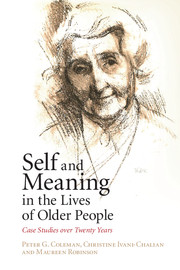Book contents
- Frontmatter
- Dedication
- Contents
- Preface and acknowledgements
- 1 Living a long life – why survive?
- 2 From self-esteem to meaning – studying psychological well-being in later life
- 3 Investigating older people's lives at the end of the twentieth century
- 4 Ageing together
- 5 Adaptation to loss of spouse
- 6 Ageing alone
- 7 Women becoming frailer
- 8 Men becoming frailer
- 9 Towards one hundred years
- 10 The future of later life: personal and policy perspectives on ageing and meaning
- Appendix: Participant characteristics
- References
- Index
10 - The future of later life: personal and policy perspectives on ageing and meaning
Published online by Cambridge University Press: 05 May 2015
- Frontmatter
- Dedication
- Contents
- Preface and acknowledgements
- 1 Living a long life – why survive?
- 2 From self-esteem to meaning – studying psychological well-being in later life
- 3 Investigating older people's lives at the end of the twentieth century
- 4 Ageing together
- 5 Adaptation to loss of spouse
- 6 Ageing alone
- 7 Women becoming frailer
- 8 Men becoming frailer
- 9 Towards one hundred years
- 10 The future of later life: personal and policy perspectives on ageing and meaning
- Appendix: Participant characteristics
- References
- Index
Summary
Our forty case studies of persons growing old in the last quarter of the twentieth century indicate something of the variety of different trajectories possible in later life. However, these accounts may be already too distant in life experience and expectations to constitute comparable models for ageing in Britain in the twenty-first century. The physical realities of biological ageing including its variability across individuals may remain similar for the foreseeable future, but the social, psychological and spiritual resources at older persons’ disposal in coping with physical and mental decline are already noticeably changed. It is these resources that largely determine how we experience the later period of ageing, whether as a welcome new stage of life with positive characteristics of its own despite the increasing limitations or as a potentially long trial to be resisted, endured or terminated as soon as possible.
Research in social gerontology has expanded considerably in the ten years and more since we completed interviews with the remaining participants of our longitudinal study. Within the United Kingdom, results have been published of two major government-funded research programmes on ageing, the first of which examined factors related to quality of life in later life including issues of identity and meaning (Walker, 2005). However, recent North American studies have paid more explicit attention to the subject of existential meaning (e.g. Krause, 2009; Hill and Turiano, 2014). These have highlighted the significant role played by perception of meaning and purpose in life in a person's continued flourishing and survival throughout adulthood and into old age. They indicate the importance of correctly identifying and sustaining sources of meaning in a person's life.
In this final chapter, we present our own thoughts on what we have learned from studying individual older people's lives and in particular how self and meaning are maintained in the process of growing older. We note those aspects of ageing that have made the most impression on us as investigators.
- Type
- Chapter
- Information
- Self and Meaning in the Lives of Older PeopleCase Studies over Twenty Years, pp. 220 - 236Publisher: Cambridge University PressPrint publication year: 2015



